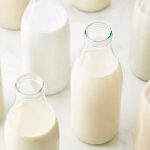
He also expressed concern that many toys Santa seeks to deliver to hopeful children, as well as gifts bought by others, simply will not be available this year.
What is coming to the world?
But then a more horrifying thought came to me. What if people leave Santa a tall glass of nut beverage with his chocolate chip (my personal favorite) cookies?
I imagine that you are chuckling right now, but could we be staring at this possibility for the future? When will the dairy industry begin to take seriously the yearly increase in consumer purchases of non-dairy fluid beverages? Recent reports indicate that sales of non-dairy ice cream are also on the rise.
According to a 2020 study by the market research firm Market Consult, 32% of consumers drink non-dairy “milks” at least once a week, and 12% said they drink dairy alternatives all the time.
Almond beverage is by far the favorite, with 69% of those who purchase non-dairy. Coconut beverage is second at 21%. Research conducted by the Plant Based Foods Association closely parallels these results.
Seventy three percent of these dairy alternatives are used with cereal, and over 60% are used for straight drinking, in smoothies and coffee, or in cooking.
In the past year since that study, oat beverages passed coconut, according to a recent poll by Nielsen. Research participants like its “smooth and creamy taste,” which I have also seen mentioned in television advertisements. Well, I can tell you that this is one consumer who will not be checking that out any time soon!
You may think that there are certain demographics that prefer dairy alternative beverages, but that is not the case. Men are just as likely to consume alternatives as women, and there is no skew toward a liberal political ideology. There is, however, a slightly higher (but not significant) level of urban and suburban, as well as younger consumers, who prefer the non-dairy offerings.
COVID-19 has certainly made it difficult to carry pre-pandemic trends forward for any type of analyses, and the plant-based beverage market did grow at a slower pace in 2020, but prior to that there had been a 61% increase in U.S. non-dairy “milk” over a five year period. Digest that for a moment — 61% in five years!
What is the dairy industry supposed to do — or what can it do — to address the threats posed by increased sales of alternative beverages?
As I noted in an article a few weeks ago, education about the nutritional benefits of milk is key to winning this fight. It is not enough to promote whole milk. We need to promote all dairy as more healthful than the plant-based products.
The Mayo Clinic made the following statement last year: “It’s tough to beat dairy milk for balanced nutrition.”
Not only does dairy have more natural nutrients, but the quality of the nutrients is also important. Just looking at dairy protein, it is of higher quality than protein from plants because it has what is referred to as “high biological value,” resulting from a complete array of amino acids that are more usable by the body.
Soy protein is considered to have a high biological value, but its usability by the body has not been studied. These notes on dairy proteins versus plant proteins from Practical Gastroenterology in 2018 also include this powerful statement: “Most other proteins (beyond soy protein) found in plant-based milks are not complete and do not offer the full array of essential amino acids.”
We in the dairy industry must do a better job of educating ourselves and making certain that the positive — and indisputable — message about dairy nutritional benefits gets distributed and repeated over and over.
Join me in making sure that Santa does not have to drink a dairy alternative with his cookies this Christmas.
The Pennsylvania Milk Marketing Board supports efforts to promote research and education related to dairy nutrition. We are always available to respond to questions and concerns. I can be reached at 717-210-8244 and by email at chardbarge@pa.gov.

























